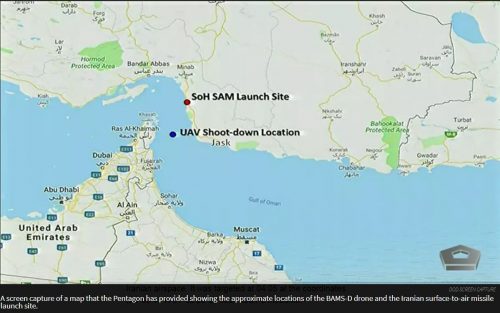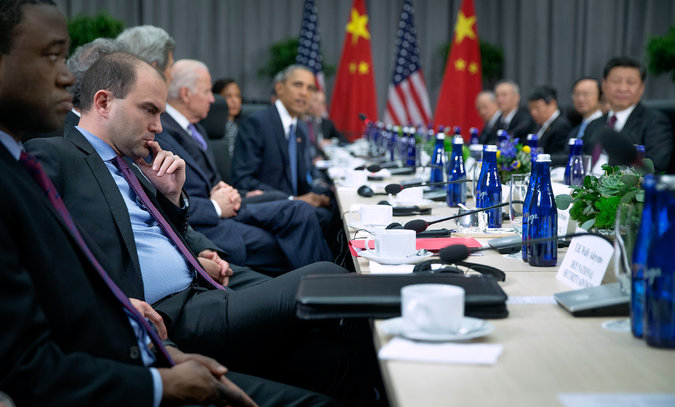It’s become something of a regular occurrence for the American mainstream media to blow a foreign policy story because of their Trump Derangement Syndrome. Yet they seem to have greatly sunk to new lows in missing the real importance of events leading to the 19 June 2019 Iranian shoot down of an American drone.

President Trump has ended the 1980 Carter Doctrine!
The free flow of oil from the Persian Gulf is no longer a “Vital Interest,” thanks to frac’ing, for a near energy independent USA.
BACKGROUND
CENTCOM confirmed Last Wednesday night of 19 June 2019, in international air space over the Strait of Hormuz, an Iranian surface to air missile (SAM) battery shot down a US Navy RQ-4N BAMS-D (Broad Area Maritime Surveillance-Demonstrator) Global Hawk. The ~$120 million drone in question was a navalised version of the USAF Global Hawk, used as proof of concept for the production MQ-4C Triton. It was essentially an unarmed, jet powered, sail plane with the wing span of a 737 jet liner and several tons of sensors. The drone fills the mission of the U-2, at similar altitudes, without the risks of a human pilot in the event of a shoot down.

Iran has claimed it used it’s ‘Third of Khordad‘ domestically built SAM system, operated by the IRGC, to shoot down the drone. This SAM system is described as a copy or derivative of the Russian Buk M3 / SA-17 GRIZZLY that incorporates the Bavar 373 missile that, in turn, appears to be a derivative/copy of the Soviet 5V55/SA-10B with additional controls. If you think of it as a late model Raytheon MIM-23 Hawk medium-range surface-to-air missile battery firing an early version of the MIM-104 Patriot PAC 1 missile, you would not be far wrong.

It was this lack of a human pilot, either as a death or a prisoner of war, that saw President Trump jump off Iran’s scripted “escalation ladder.” Instead of destroying a SAM battery and converting 150 odd IRGC missile operators into another “Martyr blood sacrifice” for the Mullah regime to celebrate. Pres. Trump responded with cyber-attacks on Iranian missile control systems to remind the Mullah’s of the West’s technological “Black Magic” and additional economic sanctions that will cause further payroll cuts to both the IRGC and it’s over seas terror networks. (Truth be told, the new economic sanctions threaten the Mullah’s power far more than any set of tit for tat military strikes.)
And in a move treated as an afterthought, if the MSM mentioned it at all, President Trump ended an era in American Middle Eastern Foreign Policy.
END OF AN ERA
It has been almost 39 & 1/2 years — 10 years before the Cold War ended — that President Carter pronounced access to Mid-East oil a “Vital Interest” that the United States would go to war to protect.
Our two wars in Iraq both have that date, and that policy, as their starting point.
Now that era is over.
Last week Pres. Trump forged a completely new Middle East Foreign policy for America. Specifically, Pres. Trump took the opportunity Iran’s military escalations leading to the shooting down of the RQ-4N to end the January 23, 1980 “Carter Doctrine” expressed as follows —
“…An attempt by any outside force to gain control of the Persian Gulf region will be regarded as an assault on the vital interests of the United States of America, and such an assault will be repelled by any means necessary, including military force.”
This is how Vandana Hari at the Nikkei Asian Review put it:
Asia has most to lose if Middle East turmoil hits oil supplies
As US-Iran tensions, can crude importers defend their interests?
JUNE 21, 2019 14:21 JST
https://asia.nikkei.com/Opinion/Asia-has-most-to-lose-if-Middle-East-turmoil-hits-oil-supplies
“U.S. President Donald Trump says he might take military action against Iran to prevent it from acquiring a nuclear weapon. But he has indicated he won’t necessarily jump in to protect international oil supplies from the Middle East if they are under threat from the Islamic Republic.
.
The position, articulated by Trump in an interview with Time magazine on June 17, should not come as a surprise, even if it appears to be at odds with the Pentagon beefing up aircraft carriers and troops in the Middle East in recent weeks, citing a threat from Iran.
.
As Trump spelt out in the interview, the U.S. is no longer as dependent on oil from the Middle East as it was, thanks to burgeoning domestic production.
.
Air Force General Paul Selva, vice chairman of the U.S. Joint Chiefs of Staff, emphasized the message a day later, pointing out that China, Indonesia, Japan and South Korea were heavily dependent on supplies moving through the Strait of Hormuz, and needed to protect their interests. U.S. Secretary of State Mike Pompeo has made similar comments.”
The pronouncement above was the full “Bell, Book and Candle” exorcism of American foreign policy — President, Joint Chiefs of Staff and Secretary of State. And please carefully note that it happened two days before the RQ-4N was destroyed.
.
While “freedom of navigation” on the high seas over all and the Persian Gulf in particular remains a “major interest” of the United State of America. It is no longer one which America will automatically go to war over.
.
In ending the Carter Doctrine, President Trump has fulfilled his 2016 campaign promise of “No More Iraq’s.”
.
By changing the cost benefit calculations of Middle-Eastern oil — no more free riding on American protection of Persian Gulf Sea lanes — the only way a nation can “win” internationally now is by “getting close” to the American hyperpower.
.
“HA-HA-HA-HA-HA-HA-HA-HA-HA-HA-HA-HA-HA-HA-HA-HA-HA-HA-HA!
.
That’s a good one!
.
“You all need to defend YOUR oil shipments through those NASTY Straits of Hormuz. The U.S. don’t need that filthy Middle East blood-oil no more. In fact, if you don’t want to spend the money and lives pounding sand in Iraq, Kuwait and Iran, we have some FINE Texas frackin’ goodness to sell at a SPECIAL price, just for YOU, our friends and allies for SO many years!”
.
Snicker, choke, GASP….”
The American Left has finally gotten what it always wanted…no more “Blood for Oil“ in the Middle East.
Somehow, I don’t think President Trump delivering that reality to them will make them very happy.
-End-
